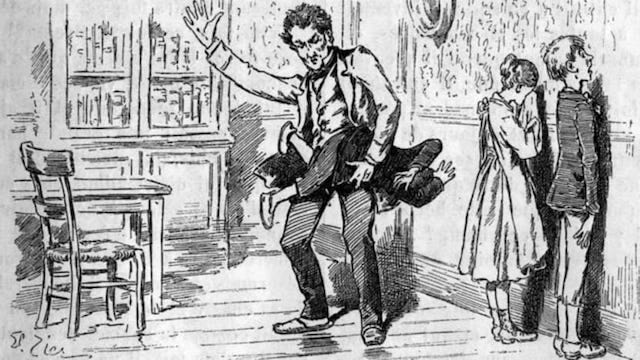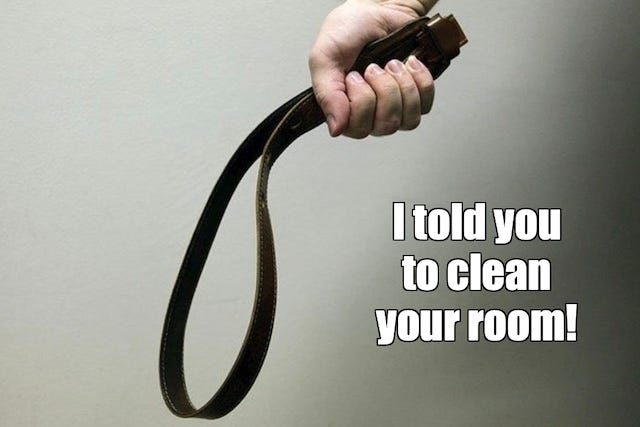The Art and Science of Parenting #50
By: Catherine Lynch and Glenn Collins
Dear Awesome Parents,
Welcome to our first post on discipline. Yes, we are finally opening that can of worms. Why? Because we wrote a post on social media about how having a good relationship with your kids is so much better for them than strict discipline… and one person responded with “Bullsh*t” and another wrote “Spare the rod…” That prompted a lot of discussion about discipline here in our household, so here’s the first of several issues dedicated to discipline.
BTW, before we moved to Substack, we hosted our newsletters on another platform. We’re in the process of moving all our earliest newsletters to Substack to make them easier for you to access. The links to our first 5 newsletters are below this week’s article.
“Spare the rod, spoil the child.”
That’s what someone commented after we posted one of our articles on Twitter recently. This person obviously felt that our emphasis on prioritizing the relationship between parent and child to be a form of “sparing the rod”. This got us talking about the saying and the mindset that underlies it. It paints a very black and white view of parenting:
Beat your kids ——> the kids turn out well
Don’t beat your kids ——> kids don’t turn out well
As if these are the only two choices.
As if there is no other way.
We flatly reject that notion. We know it’s possible to raise great kids without having to beat them. Not only is it possible, it’s preferable. In fact, any parent who has to resort to physical violence to get their kids to behave is using the most crude motivational tool a leader can use. And make no mistake about it:
Parenting is about leadership and parents are the leaders of their families.
Violence or the threat of violence is the lowest level tactic to get someone to do something. “Do what I say or I’m going to hurt you.” It can be effective, because most of us want to avoid being hurt, but there are limits to its effectiveness (see our story below). More importantly, when parents use it on their kids, there are consequences: It damages their relationship. It takes away the kid’s sense of security, and it erodes trust because it’s hard to trust people who hurt you on purpose.
Where else in society is it OK to beat someone? Imagine working for someone who could beat you if they weren’t satisfied with your work, or you questioned their orders. Would you want to continue working for them? What if you had no choice?
The “Spare the rod, spoil the child” approach to parenting is well established and has a long history. It’s proponents (many of whom were raised that way themselves) see nothing wrong with it. They believe that beating kids is the only way to teach proper behavior. Any other way simply means the kids won’t respect the parents and therefore won’t listen to them. (Not true, of course. Read any of our previous articles to get the details on how to raise healthy, happy kids without beating them).
Let us tell you about a family we know who used a “Don’t spare the rod” approach to parenting.
The father in this family was born in the 1930s. He was the youngest of two kids, and had an older sister. His father was a strict disciplinarian who relied almost exclusively on lectures and strapping as a way to teach his kids proper behavior. Woe to the child who disobeyed or didn’t jump to a task quickly enough. The standard punishment was a trip to the basement where they had to pull their pants down so their father could strap them on their bare bottoms with his belt.
How the two kids developed with this form of discipline was starkly different, but each dysfunctional in its own way. The daughter was willful and got punished frequently. So frequently in fact that she became desensitized to the strappings. It got to the point where she didn’t care if she got punished or not. Her attitude became “I’m going to do whatever I want because all they’re going to do is beat me, and I can take that. I don’t care anymore.”
The boy regularly witnessed his older sister being beaten. It looked and sounded awful. He wanted no part of it. He was terrified of being beaten and terrified of his father. He did what he was told and never objected or spoke up for himself. As a result, he was a very obedient child. Every parent’s dream. Right?
Let’s skip ahead to the lives these kids as adults. The daughter continued with her attitude of “I’m going to do whatever I want and I don’t care about the consequences.” She was an alcoholic who couldn’t hold a job and wasn’t able to stay in a relationship. She died young as a result of her addictions. The son went to college, married his high school sweetheart, raised a family, and had a successful professional career. That sounds great, right? Isn’t that what successful parenting is supposed to produce? A successful adult? Maybe the sister was just a bad seed.
That’s just the surface of this man’s life, however. If you dig deeper, you discover this: He was verbally and emotionally abusive to his wife and cheated on her. He regularly dished out verbal, psychological, and physical abuse to his kids.
Everyone in his family was afraid of him. His kids did all they could to avoid his notice. They fled the home as soon as they could and had almost no relationship with him as adults. This lonely old man now lives in a nursing home and wonders why his kids don’t call or visit.
If you judge his life from a professional and financial perspective, he was successful. The “Don’t spare the rod” parenting “worked”. But if you look at it from a relationship and happiness perspective, his life was a disaster. Professional and financial success are important, but so is being able to form loving, positive relationships with the people in your life. In fact, if you want to lead a happy life, the research is clear: it’s the quality of your relationships that has the biggest impact on your happiness. Watch this TED talk to find out more.
The “Don’t spare the rod” parenting wasn’t successful by any metric for his sister. Her life was a tragedy of unfulfilled potential. Any hope of a happy life was beaten out of her in a battle of wills with her father.
As a parent you have lots of tools you can use to teach your child values and good behavior. Violence, and its threat, is certainly one of them; but there are other, better options that we’ll discuss in detail soon: Natural and logical consequences. Belonging. Empathy. Agency. Non-violent punishments. Incentives. Role modeling. Reason. And above all of these: Your relationship with them.
Nurturing your relationship gives you the best chance turning your kid into a happy, well-adjusted adult who will live a fulfilling and successful life.
When you have a great relationship with your kid, you have influence. Not just while they’re with you, but more importantly, when they’re out in the world and you’re not there. i.e., for the rest of their life.
Don’t just take our word for it:
The research on spanking is clear: It doesn’t work and it increases the likelihood of negative outcomes for the child. In 2016 Elizabeth T. Gershoff and Andrew Grogan-Kaylor published a meta-analysis of spanking research. Their analysis used data from more than 75 studies, over 50 years, from 13 different countries, with over 160,000 children included. They found that for children “spanking was associated with more aggression, more antisocial behavior, more externalizing problems, more internalizing problems, more mental health problems, and more negative relationships with parents. Spanking was also significantly associated with lower moral internalization, lower cognitive ability, and lower self-esteem.”
Here’s the link to a summary of their findings, and here’s the link to the full meta-analysis if you want to take a deep dive.
Our first 5 Newsletters are now available on Substack!
Before we moved our Newsletter to Substack, we published 20 articles on another platform. We’re excited to inform you that we’ll be adding them to our Substack so they’ll be easier for you to find and read. We’ll publish 5 of our original articles each week until they’re all here. Here’s the first 5 links:
Issue 1: The Gottman’s 5:1, Thank You Cards, and a puppy
Issue 3: When a choice is not a choice, the most important skill, and a baby Sandhill Crane
Issue 5: How to manage your moods, the emotional tone of your house, and a butterfly






